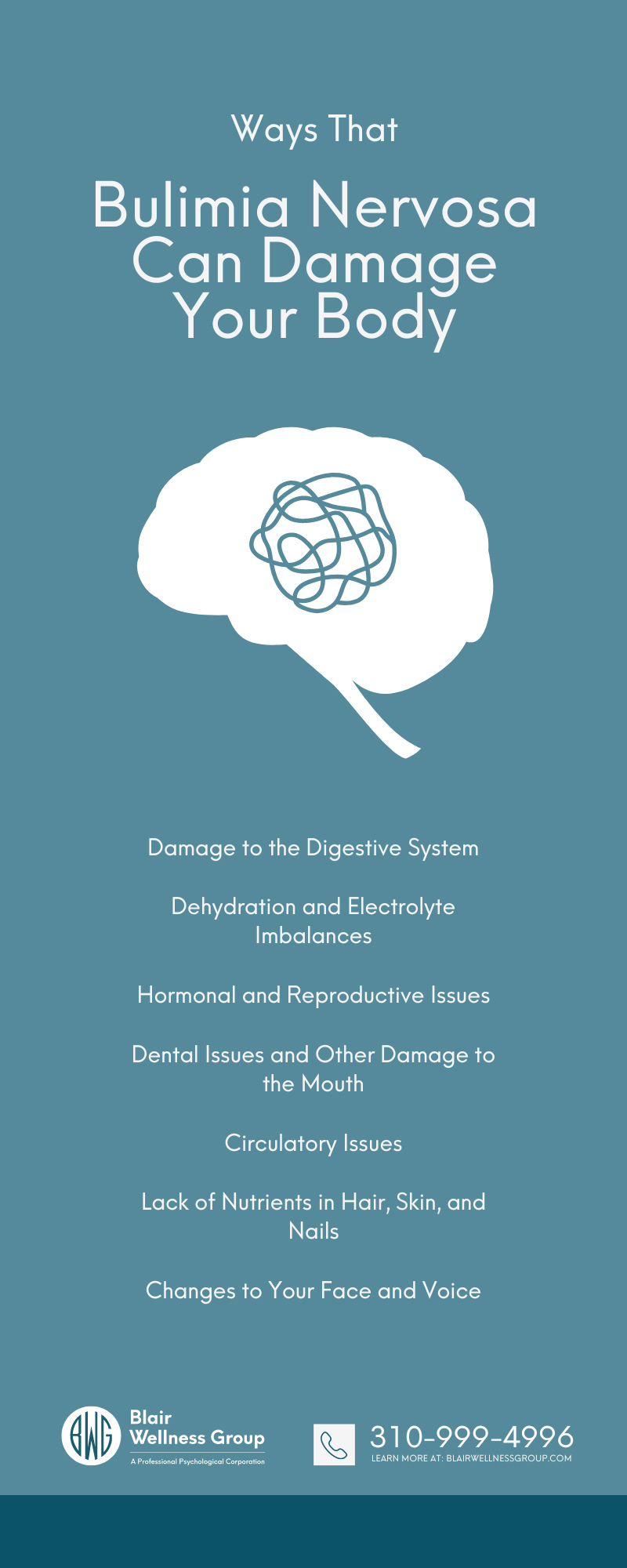Bulimia Nervosa is one of the most common Eating Disorders. Like all Eating Disorders, Bulimia causes severe mental and emotional distress. Low self-esteem, an unhealthy preoccupation with body weight, isolation, or feelings of guilt are just some examples of the negative effects Bulimia has on your thoughts, behaviors, and emotions.
However, there are also many physical symptoms of Bulimia. Individuals who don’t seek professional mental health treatment for their Eating Disorder experience both short- and long-term physical consequences. Bulimia affects the entire body, and the longer you go without treatment, the more damage you will sustain. Read on to learn about the ways that Bulimia Nervosa can damage your body and see why it’s important to seek professional help.
The Dangers of Binging and Purging
Bulimia Nervosa revolves around the acts of binging and purging. Binging is the act of overindulging by eating an excess amount of food, often to the point of discomfort. To counteract this, people with Bulimia will then purge through behaviors such as self-induced vomiting or taking laxatives.
Both binge eating and purging have serious consequences for the body. From short-term effects such as a sore throat from vomiting to long-term complications like chronic digestive issues, binging and purging take a toll on your physical health. Unfortunately, these symptoms are just the beginning of the damage that Bulimia can cause. It’s important to take the physical consequences of Bulimia Nervosa as a serious sign to seek help from a Licensed Clinical Psychologist who specializes in Eating Disorders.
Damage to the Digestive System
Digestive issues are among the most common ways that Bulimia Nervosa can damage your body. The cycle of binge eating and purging wreaks havoc on your mouth, throat, stomach, and intestines.
Digestive symptoms show up early and can be an obvious initial sign of the physical harm Bulimia causes. Early issues include a sore throat or stomach pain as a result of self-induced vomiting. As the Eating Disorder continues, these symptoms can worsen to even more severe and threatening conditions.
Individuals who purge through self-induced vomiting will experience issues in the throat and esophagus. Damage to the esophagus can range from irritation to tears that create lasting damage. Chronic vomiting can also rupture the esophagus and cause bloody vomit and other complications.
Those who purge by using diuretics or laxatives will likely experience kidney damage, hemorrhoids, and long-term complications with bowel movements.
There are also many stomach issues that stem from Bulimia, including irritation and stomachaches. Heartburn, acid reflux, bloating, diarrhea, or constipation can also occur because of binging and purging behaviors.
Dehydration and Electrolyte Imbalances
Purging leads to a loss of fluids, which causes a wide range of complications for the body. Most notably, purging can cause severe dehydration, leaving you weak and fatigued.
Individuals with Bulimia also frequently suffer from electrolyte imbalances. Dehydration causes you to lose necessary electrolytes, such as sodium and potassium. In turn, this loss puts strain on your blood vessels, heart, and other organs. Resulting heart problems include an irregular heartbeat, also known as arrhythmia, a weaker heart muscle, and even heart failure, which can prove fatal in severe cases.
Hormonal and Reproductive Issues
Bulimia Nervosa can create nutritional deficiencies that have a wide range of consequences throughout the body. A lack of nutrients causes issues with hormones, menstruation, reproduction, and more. Women with Bulimia often experience irregular periods or stop having their periods altogether. These hormonal imbalances can also lead to fertility issues, such as ovaries no longer releasing eggs.
Pregnant women are also at risk of serious physical consequences stemming from Bulimia. Pregnancy complications caused by Bulimia include:
- Maternal high blood pressure
- Higher risk of cesarean delivery
- Gestational diabetes
- Babies with low birth weights
- Birth defects
- Miscarriage
- Trouble breastfeeding
The physical consequences of Bulimia put both mothers and their babies at risk during and after pregnancy.
Dental Issues and Other Damage to the Mouth
Individuals who purge through self-induced vomiting also must contend with dental issues. Stomach acid damages tooth enamel and can lead to discoloration and tooth decay. Many individuals with Bulimia also experience complications like gum disease, sores within the mouth, and swollen salivary glands.
Circulatory Issues
Bulimia Nervosa also poses a threat to your circulatory system. Dehydration, a lack of nutrition, weak muscles, and severe fatigue stemming from Bulimia can cause a variety of dangerous problems.
One example is low blood pressure. Binging and purging can cause your blood pressure to drop to the point of fainting. You might also experience a weakened pulse, anemia, or a drop in body temperature due to poor circulation.
Lack of Nutrients in Hair, Skin, and Nails
Bulimia Nervosa also affects the integumentary system, which includes hair, skin, and nail glands. A lack of nutrients from purging behaviors can cause dry or frizzy hair, rough skin, brittle nails, and other issues. Hair and nails begin to break easily. Some individuals with Bulimia even experience hair loss over time.
Changes to Your Face and Voice
Bulimia affects your appearance beyond fluctuations in weight. Vomiting can cause small veins to break in the skin around your face, create red spots around the mouth, and even cause rashes and acne.
Purging through vomiting can also irritate the salivary glands, which in turn cause your neck and face to swell and create a distinctive, puffy look. Individuals with Bulimia might also experience noticeably red, irritated eyes.
Bulimia can also damage the vocal cords. Chronic self-induced vomiting exposes the vocal cords to stomach acid, which irritates them and can alter your voice.
Treat Eating Disorders at the Source
The physical symptoms of Bulimia Nervosa will persist until you seek professional mental health treatment from a Licensed Clinical Psychologist. A Licensed Clinical Psychologist treats your Eating Disorder with evidence-based treatment modules, addressing the issue at its source so that you can heal completely and permanently.
Dr. Blair and her team have experience treating Bulimia Nervosa and other Eating Disorders. By using expert treatment models within a customized treatment plan, Dr. Blair and the team at Blair Wellness Group provide healing and relief for the physical, mental, and emotional effects of an Eating Disorder. When you need effective Eating Disorder treatment in Orange County, Beverly Hills, Bel Air, Century City, Brentwood, Westwood, Irvine, Newport, Huntington Beach, Laguna Beach, Corona Del Mar, Dana Point, Mission Viejo, or Aliso Viejo, the team at Blair Wellness Group is here to help.















